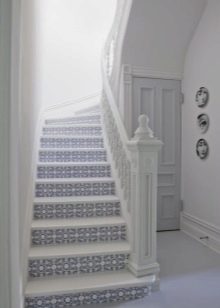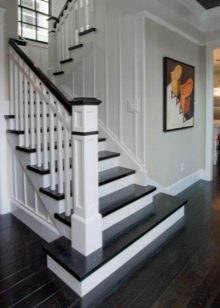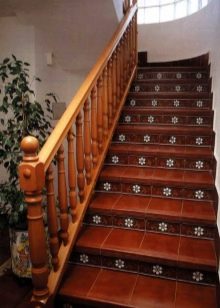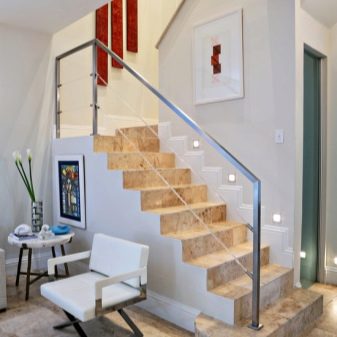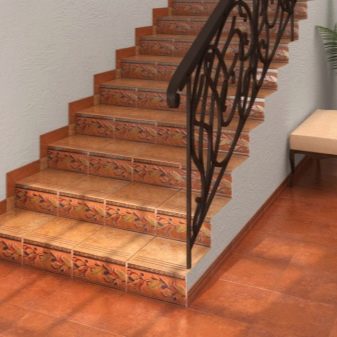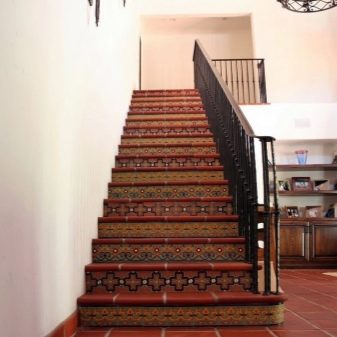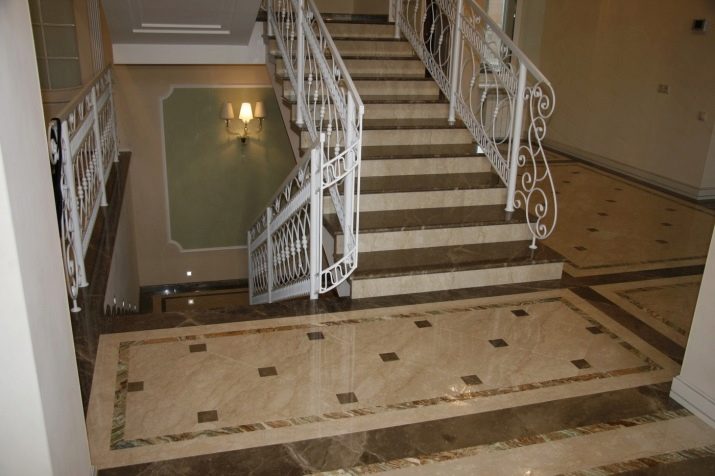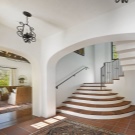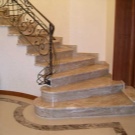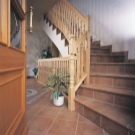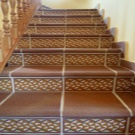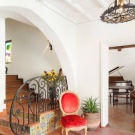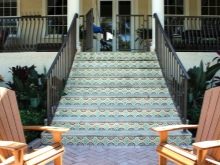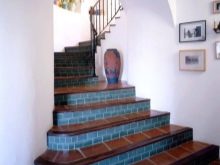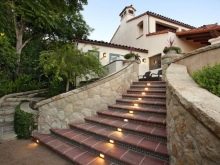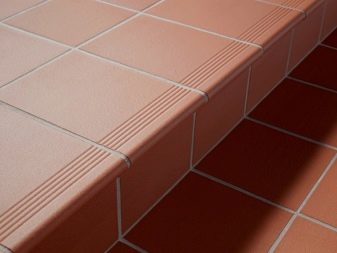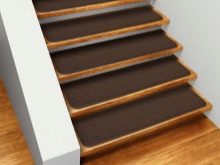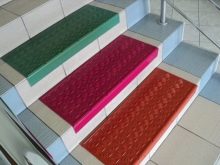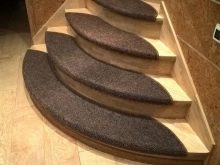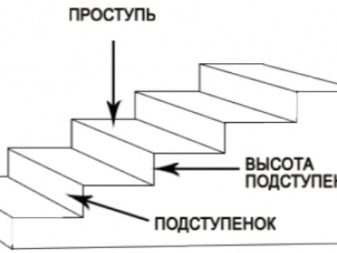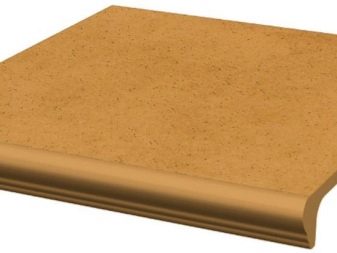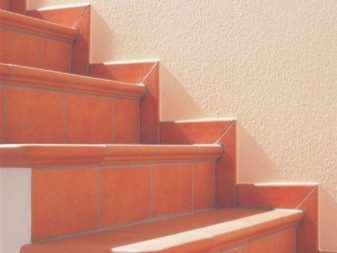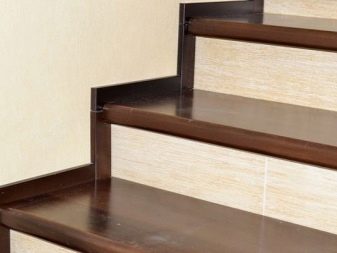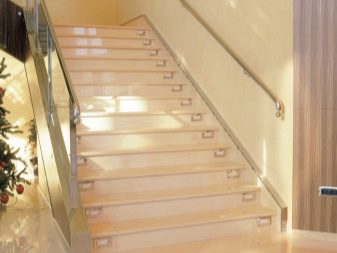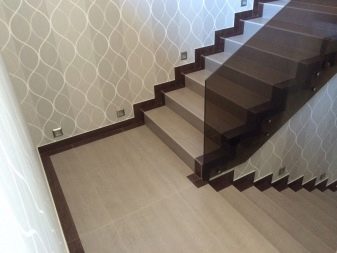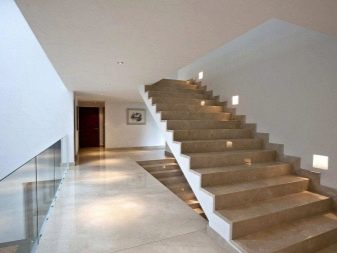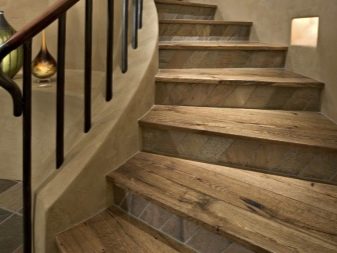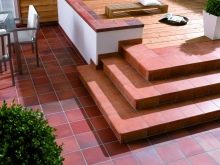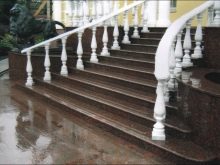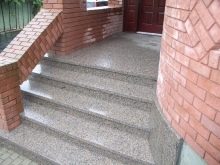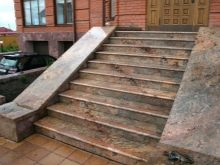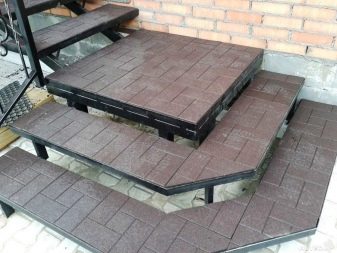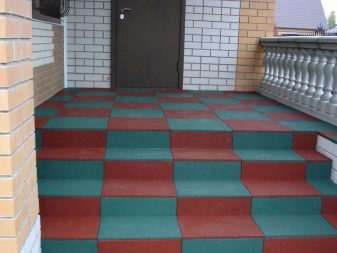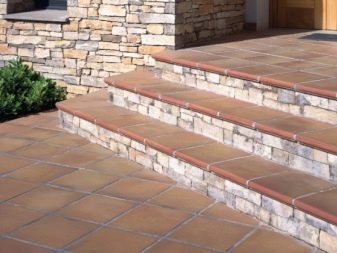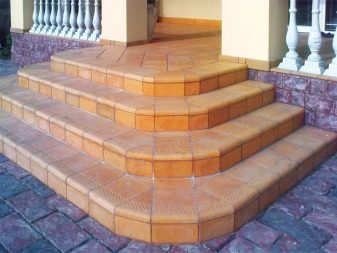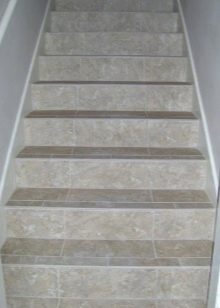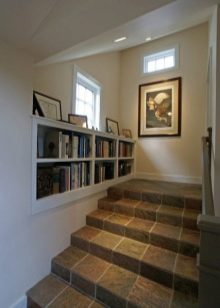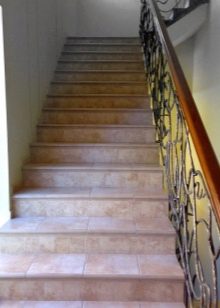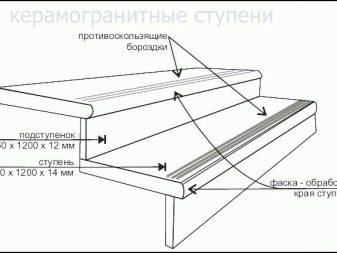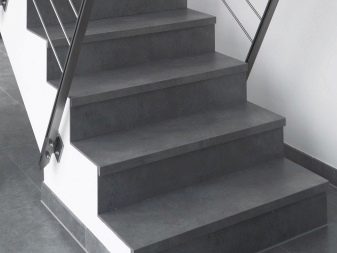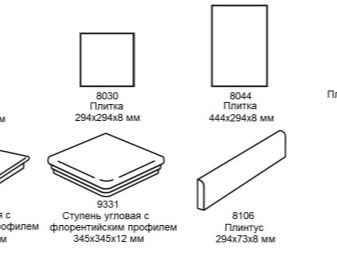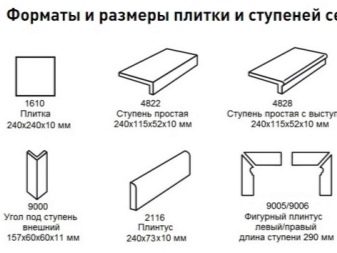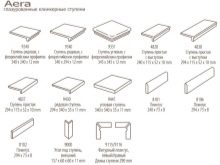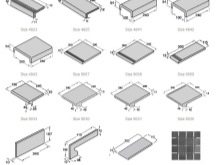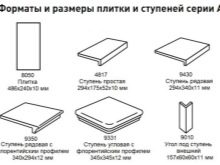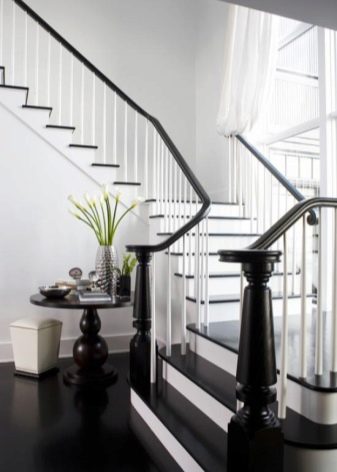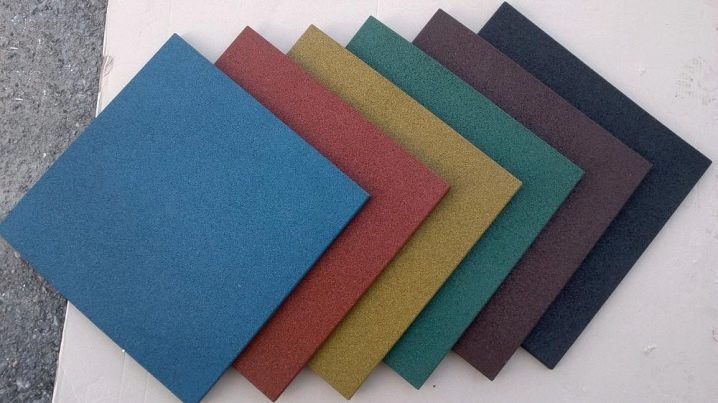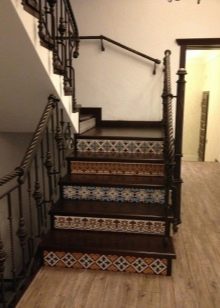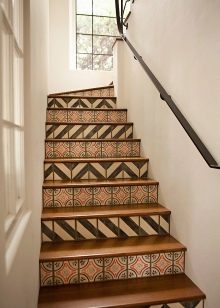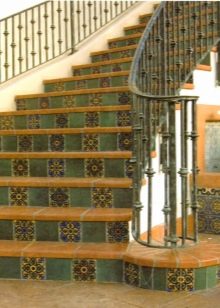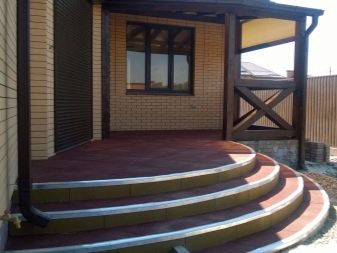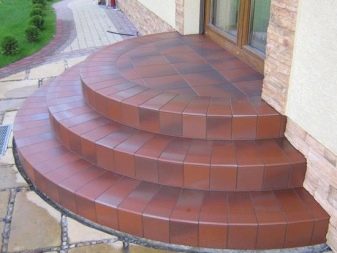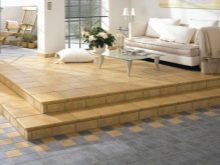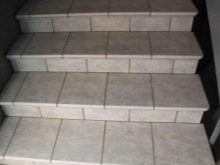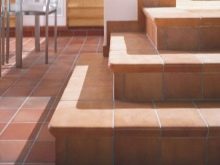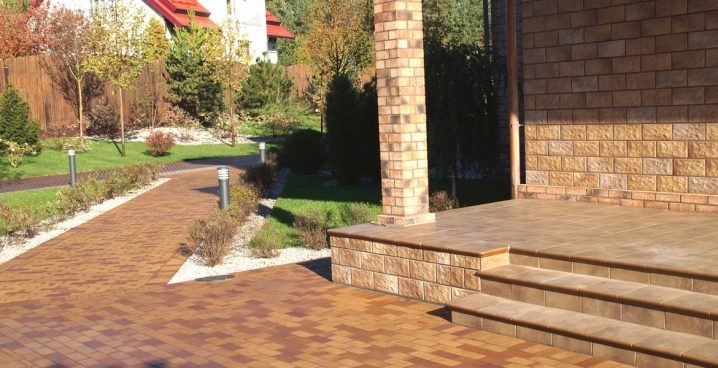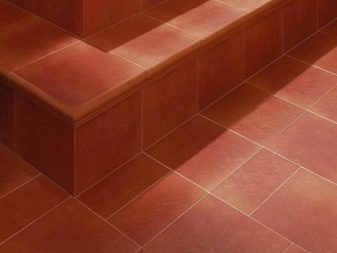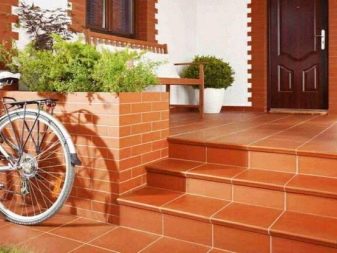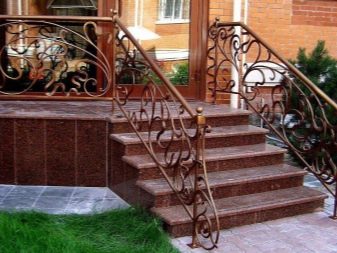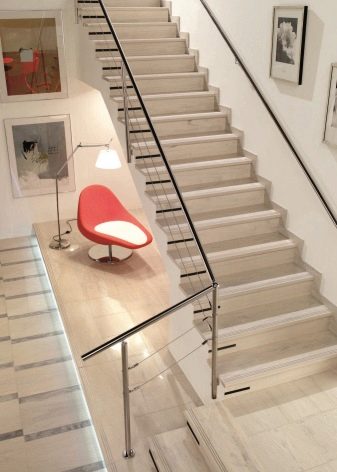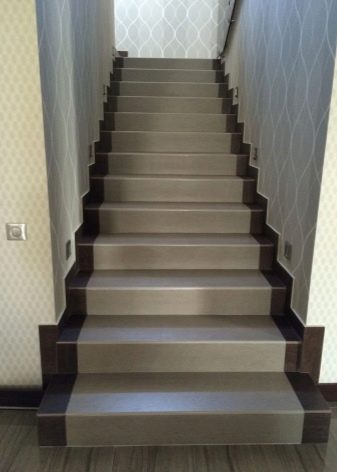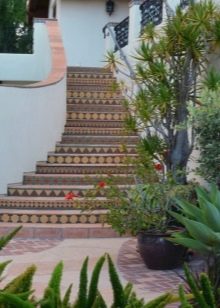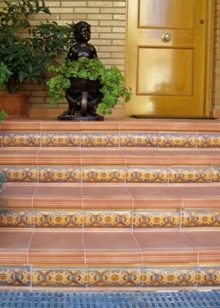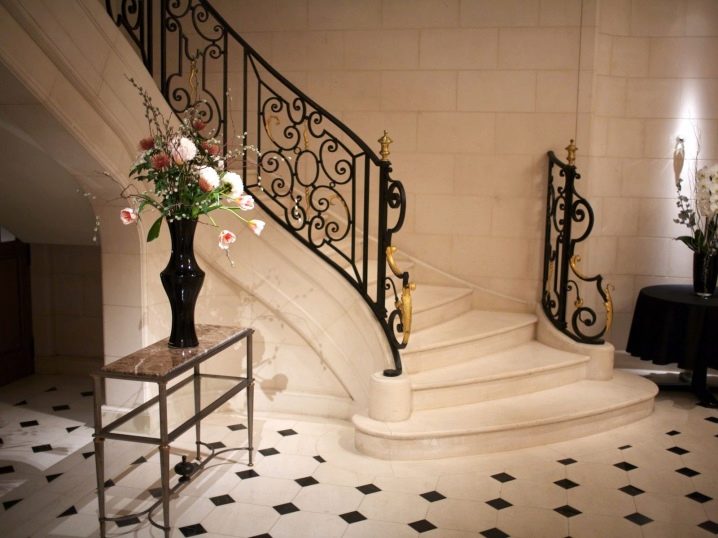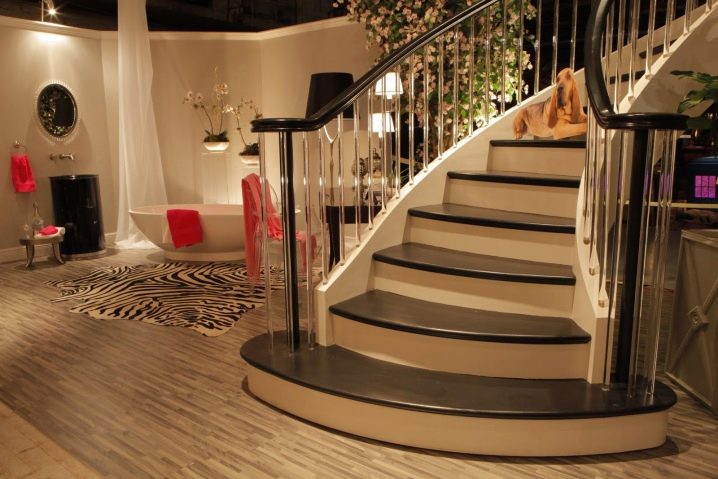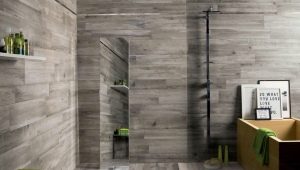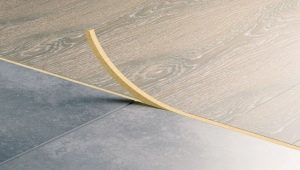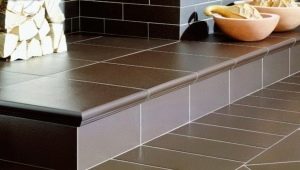Tile for steps: types and their characteristics
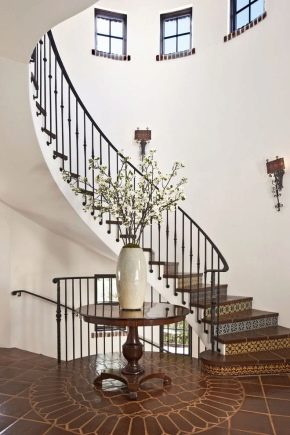
Ladders - an important element of any room that requires special attention during the design. The appearance of the steps can tell about the tastes of the owners and their material condition. Internal designs should be in harmony with the style of the whole house, be its decoration.
The use of modern tiles will create a beautiful and practical staircase, which will become a real gem of the interior.
Special features
Floor tile for facing steps has its own characteristics and must have the following characteristics:
- resistance to abrasion and deformation;
- durability and reliability;
- safety - that is why most often choose a non-slip coating;
- resistant to low temperatures and moisture.
In addition to the above, facing tiles for stairs should be beautiful, but unpretentious in the care. Special corrugated coating can reduce the level of trauma. Therefore, choosing a tile It should be preferred models with non-slip, rough surface.
Kinds
Facing the steps requires special attention. Not only that they should look harmoniously in the interior, they also have serious operational requirements.
There are several types of cladding steps:
- Tiling with overhang. This method is considered the most budget option. The tile is laid with a small overhang above the step. It is better to use products with glazed face. It is worth noting that the edge of the tile over time can collapse, so this option is only suitable for stairs with low load.
- Ceramic with a safe edge. Used models with a grooved edge that prevents slipping when walking. Laying the tile is carried out on the edge of the tread with the overhang, so it is important that the overhang of the product matches the thickness of the riser.Most often, the edge of the products is rounded, which gives the staircase a special charm. This lining option is used for both internal and external stairs.
- Corner tile. This is a great alternative to grooved-edge models. Products are angular ceramic profile, which is placed on the tread in such a way that the upper side of the tile covers its part. The rest of the surface steps tiled with ordinary ceramics. When choosing a profile, it is important to take into account that its thickness should correspond to the thickness of the tile, which covers the tread and risers.
Their installation occurs at the stage of laying tiles, so dismantling without deformation of the entire coating is almost impossible.
- Cover for steps. If the ladder is used daily and is subject to heavy loads, then for the cladding usually use interchangeable profiles on a metal base. The lower non-slip layer is screwed to the base of the steps with screws. And the top, made of plastic PVC is replaceable and is a corrugated coating. Most often, the lining is used when you need to create a practical coating on the stairs.They are best suited for the decoration of vertical edges, steps in the bathroom and in the kitchen. When using a brick covering special models of tiles are applied. The surface colors can be monochromatic, multi-colored or with imitation of a natural stone pattern. Effectively look in the interior profiles with a contrasting color.
- Ceramic lining. This type of ceramic tiles for stairs is presented in a wide range. Especially popular are the corners, stripes and round rods. The latter fit more closely to the edge of the steps due to the notch in the back side. Usually they come in the same set with the tile and have a suitable length and coloring.
- Tread or tile with capinos. This type of ceramic is a tread with rounded edges. Almost all models are covered with anti-slip material: cuts, grooves, notches can be on the surface of the tile. The shape of the products can be different; you can find tiles for rounded, straight and even figured steps on sale.
- Plinth. It is used to give a finished look to the steps.Manufacturers offer two types of plinths: right-sided and left-sided, which is important to consider when purchasing this material.
- Tile for pivot steps is present in any collection and makes it easier to finish the treads. When purchasing a ready-made tile set, it is necessary to carefully calculate the amount of material, since it is extremely difficult to find such a tile separately.
- Riser - extremely important part when facing steps. This is a special type of tile that covers only the frontal part of the steps. Usually they go in the collection of a collection of stair tiles, but if necessary they can be made independently.
The risers play a more decorative role and give the whole structure a finished look.
Materials
The most popular universal material for facing steps is porcelain stoneware. It not only looks harmoniously in any interior, but is also able to serve for many years without losing its own properties. For registration steps used products with a relief or unpolished (glazed) surface. Porcelain tiles for stairs can be monolithic, complete or prefabricated.It should be noted that monolithic steps look much more impressive than their counterparts, they are usually used for cladding internal stairs.
This material has a high price, but its high cost is fully justified by the long life of the coating. Particularly beautiful porcelain looks paired with forged handrails or railings, as well as metal fences.
Another versatile, but beautiful option is considered tile clinker. She looks amazing on the stairs inside and outside the house. The range of clinker tiles includes high-quality products of domestic and foreign production, which allows each client to choose the appropriate option.
Clinker perfectly absorbs moisture, so it can even be used for cladding steps in swimming pools and saunas.
For real aesthetes, manufacturers offer such an elegant version of the stair design, as granite tiles. Its advantages are in excellent performance, reliability and durability. It does not fade and is not erased. In addition, the range of ceramics from granite is presented in a variety of colors.
The only disadvantage of this material is the high price.
For stairs with high traffic better to buy rubber tiles. Its aesthetic properties can not compete with previous copies, but it is extremely durable and durable. This is an option for those who first of all appreciate quality and practicality, and to whom the decorative properties of the lining do not play any role. Rubber anti-slip tiles are often used to design stairs in preschool and school facilities, municipal buildings, medical complexes.
With it, you can easily hide the flaws of the surface, and a convenient coating will make the stairs comfortable for permanent use.
Paving slabs (concrete) - not the most suitable option for the design of stairs, it is more suitable for landscape design. Doing the porch lining without prior experience will be quite difficult. It is necessary not only to calculate the exact number of tiles, but also to calculate the height of the substrate and the border.
It is best to lay paving tiles paired with bricks and ceramics - this will allow you to draw up the climbs.
Often there are combinations of tiles of different colors, due to which the stairs are beautiful and elegant.
For lining internal structures use ceramic tiles. Usually take a model with a special cut along the edges or figured edge. Such products resemble ceramic granite, but with their help it is impossible to make a monolithic coating. But the combination of several shades for facing the staircase gives spectacularity to the whole structure.
Dimensions
For facing of steps it is better to choose monolithic products, then the appearance of the whole structure will be much tidier. To do this, manufacturers produce special series of floor ceramics with the appropriate dimensions.
For example, the parameters of 1200x300x10 mm are considered to be optimal sizes of porcelain stoneware for steps. However, there is currently no standard for finishing ceramic tiles. Its size depends on the height and width of the steps, so you can only talk about the approximate parameters, which vary from 25 to 35 cm.
It is accepted to veneer large structures with large products.Their parameters may not match the size of 1200 by 300 mm, but the width and height of the tile will be clearly larger than standard products.
Many manufacturers offer to make tiles for stairs to order. To avoid inconsistencies with the ladder design, you should carefully measure the parameters of all the details of the stairs.
The thickness of tile products depends on its method of manufacture and type of destination. For outdoor structures use tiles of at least 18 mm thick. For lining internal structures used models whose thickness is not less than 14 mm. There are porcelain stoneware products whose thickness is less than 14 mm.
Design
The range of tiles for ladder designs has many options. Here there are products with the design of stone, marble, wood. There are models with a pattern or a simple background coating.
The black or white ladder looks especially impressive.
Chess colors of ceramics looks amazing against the background of the interior in the style of Rococo, classicism, Empire.
The use of rubber tiles opens up a wide range of design options, since its palette is replete with all sorts of colors.The choice of a specific color depends on the wishes of the customer. It should be borne in mind that the appearance of the structure should harmoniously fit into the overall interior or exterior of the house, depending on the location of the stairs.
Traditionally, you can lay out the stairs of rectangular or square ceramics, but this solution is not popular with modern designers. Today, manufacturers of ceramic products produce ready-made sets for finishing stairs, the parameters of which do not fit into obsolete standards.
Remarkable use of opposite colors - This approach is popular with modern designers. This simple Reception allows you to make the appearance of the design solemn and stylish.
Particularly beautiful is the combination of dark and light tiles. The marble inserts on the porch of the staircase will be spectacular and catchy, but more gentle tones and simple solutions will be appropriate inside the room.
For facing a semicircular staircase, items in light brown colors will suit, and the ornament on the risers will revive the design and make it more elegant.
Manufacturers and reviews
Today the market of facing materials is full, so it is extremely difficult to choose the best manufacturer of stair tiles. Almost all manufacturers strive to create a quality product that will delight with its original appearance over the years.
Among the many similar products stands clinker products of the company. Stroeher. German-made ceramics fell in love with consumers for a variety of modifications and high strength of products. On sale are Florentine, convex, rectangular products, as well as pottery with notches. The color palette is impressive in natural shades - from brown to dark gray. Thanks to modern technologies of digital printing, the manufacturer managed to create unique products with a stunning imitation of the structure of natural stone. The antiskid glazed surface allows to apply Stroeher tile both in rooms, and on the open areas.
Unglazed tile is presented in an assortment with a different texture and has the color of natural clay of different shades.
Among domestic manufacturers are widely demanded tile from a Russian company Ecoclinker. The use of environmentally friendly materials, as well as resistance to low temperatures, abrasion, chemicals makes it popular among Russian consumers.
The advantages of tiles from this manufacturer include anti-slip coating products, which also has refractory properties. Ecoclinker tiles are easy to install and do not require any special care.
Tips for choosing
When purchasing ceramics for facing steps, it is necessary to take into account several factors:
- It is strictly not recommended to lay tiles of the same color with the floor covering - this is fraught with falls and injuries.
- You can not use ceramics designed for cladding internal structures for the design of stairs on the street. In this case, the cracking of the material in the shortest possible time guaranteed.
- When choosing a stair tile you should be familiar with its degree of abrasion - it should be high. Traditionally, tiles of 3 categories are used for finishing of internal stairs, and for facing of external constructions it is better to use products of 4 categories.
- Ceramics should have a non-slip coating.Of course, there is also polished ladder material, but it is best to purchase products with grooves, then the level of injury risk will be much lower.
- Optimal for the application are products with indicators of resistance to moisture from 3 to 10%. These include granite tiles and clinker tiles.
- When choosing outdoor tiles, resistance to low temperatures is important. The smaller the porosity of the material, the less it absorbs moisture, which adversely affects the strength properties of products.
- The appearance of the tile must be maintained in the style of the interior of the room or exterior of the site on which the steps are located.
Beautiful lining examples
Versatile design steps - facing porcelain. For the street version, light brown, orange and gray tones are considered optimal.
The white tile in the facing of the internal stairs can transform the interior of the hall beyond recognition. It perfectly combines with natural materials - wood, stone, glass.
It fits perfectly into a wide variety of styles ranging from classic to modern.
The staircase, decorated with dark and light ceramics at the same time, will become a real decoration of a country house. Especially beautiful will look designs with glass elements, framed with stylish railings.
How to put the tiles on the steps with their own hands, see the next video.
